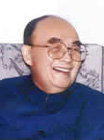

Huang Jiqing (1904.03-1995.03) is a native of Renshou, Sichuan province. He is a world-renowned geologist. He graduated from Geology Department, Peking University in 1928 and received his doctorate in science from University of Neuchatel Switzerland in 1935. He was elected as an academician of Chinese Academy of Sciences in 1955. The positions he had ever worked on included: President of Central Research Institute, Head of Southwestern Geology Bureau, Chief Engineer of Petroleum Geology Bureau, and Honorary President of Chinese Academy of Geology Science, and so on.
His major researches focused on providing direction on general prospecting for geology mineral resources and on petroleum geology and tectonic structure. In 1940s, he invented and developed theory of polycyclic tectonic movement in orogenic belt or geosynclines folding belt, which was adopted by many mineral deposit scientists. Huang attached importance to petroleum geological study all along. In 1942, he directed petroleum geological prospecting in Xinjiang Autonomous Region and finished a Report on Geological Prospection of Oil Field in Xinjiang in 1943, which advanced many new points: terrestrial facies theory on origin of petroleum and oil richness in multi phase and multi-layer. In 1945, Huang completed a monograph, titled "On Major Tectonic forms of China" in English, which was regarded by all as one of the most important works for study of Asian geological structure, and which won him State Natural Sciences Award, Second Class. From 1955 to 1957, based on his theories, he made a complete and detailed agenda for general prospecting of petroleum and gas in China, which in a large part directed the later discovery of gas field in Daqing, Shengli, Dagang, North China, Liaohe, and Tarim Basin. He also laid a foundation for Chinese geological study on Chinese Permian stratigraph by writing a report on "Permian Stratigraphic Classification and Correlation in South China Platform", which was highly recognized by overseas and domestic geological scientists. He directed and compiled a complete Chinese geological map in a proportion of 1:1,000,000, which was the first geological map ever made in the world, and which won him State Natural Sciences Award, First Class. In 1980s, he gave further specific direction on geological exploration for oil field in Tarim Basin and Daqing. He was awarded Ho Leung Ho Lee Merit Award in 1994, the most influential non-governmental prize in science and technology in China.